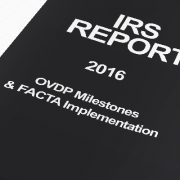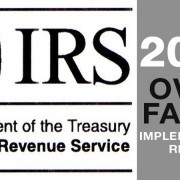The Door Is Closing – IRS To End Offshore Voluntary Disclosure Program.
Taxpayers with undisclosed foreign assets are urged to come forward before the Offshore Voluntary Disclosure Program (“OVDP”) closes September 28, 2018.
The IRS announced on March 13, 2018 that it will begin to ramp down the 2014 Offshore Voluntary Disclosure Program (“OVDP”) and close the program on September 28, 2018. In a statement made by Acting IRS Commissioner David Kautter, “Taxpayers have had several years to come into compliance with U.S. tax laws under this program. All along, we have been clear that we would close the program at the appropriate time, and we have reached that point. Those who still wish to come forward have time to do so.”
OVDP enables U.S. taxpayers to voluntarily resolve past non-compliance related to unreported foreign financial assets and failure to file foreign information returns. Since OVDP’s initial launch in 2009, more than 56,000 taxpayers have come forward to avoid criminal prosecution and secure lesser penalties than what the law provides. The IRS reports that through OVDP, they have collected $11.1 billion in back taxes, interest and penalties. The number of taxpayer disclosures under the OVDP peaked in 2011, when about 18,000 people came forward. The number steadily declined through the years, falling to only 600 disclosures in 2017. This decrease is not surprising given that many people have already come forward to secure the benefits of OVDP seeing the success of the implementation of the Foreign Account Tax Compliance Act (“FATCA”) and the ongoing efforts of the IRS and the Department of Justice to ensure compliance by those with U.S. tax obligations with respect to undisclosed foreign financial assets and unreported foreign income.
Tax Enforcement Continues
Stopping offshore tax noncompliance remains a top priority of the IRS. Don Fort, Chief, IRS Criminal Investigation stated that the IRS will continue ferreting out the identities of those with undisclosed foreign accounts with the use of information resources and increased data analytics. Since 2009, the IRS Criminal Investigation has indicted 1,545 taxpayers on criminal violations related to international activities, of which 671 taxpayers were indicted on international criminal tax violations.
Where a taxpayer does not come forward into OVDP and has now been targeted by IRS for failing to file FBAR’s, the IRS may now assert FBAR penalties that could be either non-willful or willful. Both types have varying upper limits, but no floor. The first type is the non-willful FBAR penalty. The maximum non-willful FBAR penalty is $10,000. The second type is the willful FBAR penalty. The maximum willful FBAR penalty is the greater of (a) $100,000 or (b) 50% of the total balance of the foreign account. In addition the IRS can pursue criminal charges with the willful FBAR penalty. The law defines that any person who willfully attempts in any manner to evade or defeat any tax under the Internal Revenue Code or the payment thereof is, in addition to other penalties provided by law, guilty of a felony and, upon conviction thereof, can be fined not more than $100,000 ($500,000 in the case of a corporation), or imprisoned not more than five years, or both, together with the costs of prosecution (Code Sec. 7201).
For the non-willful penalty, all the IRS has to show is that an FBAR was not filed. Whether the taxpayer knew or did not know about the filing of this form is irrelevant. The non-willful FBAR penalty is $10,000 per account, per year and so a taxpayer with multiple accounts over multiple years can end up with a huge penalty.
Streamlined Procedures and Other Options
A separate program, the Streamlined Filing Compliance Procedures, for taxpayers who might not have been aware of their filing obligations, has helped about 65,000 additional taxpayers come into compliance. The Streamlined Filing Compliance Procedures will remain in place and available to eligible taxpayers. Additionally, eligible taxpayers can qualify for relief under the Delinquent FBAR Submission Procedures or Delinquent International Information Return Submission Procedures.
What Should You Do?
Don’t let another deadline slip by! If you have never reported your foreign investments on your U.S. Tax Returns or even if you have already quietly disclosed you should seriously consider participating in the IRS’ 2014 Offshore Voluntary Disclosure Program (“OVDP”). Once the IRS contacts you, you cannot get into this program and would be subject to the maximum penalties (civil and criminal) under the tax law.
Let the tax attorneys of the Law Offices Of Jeffrey B. Kahn, P.C. resolve your IRS tax problems, get you in compliance with your FBAR filing obligations, and minimize the chance of any criminal investigation or imposition of civil penalties. Tax problems are usually a serious matter and must be handled appropriately so it’s important to that you’ve hired the best lawyer for your particular situation. The tax attorneys at the Law Offices Of Jeffrey B. Kahn, P.C. located in Orange County (Irvine), the San Francisco Bay Area (including San Jose and Walnut Creek) and elsewhere in California are highly skilled in handling tax matters and can effectively represent at all levels with the IRS and State Tax Agencies including criminal tax investigations and attempted prosecutions, undisclosed foreign bank accounts and other foreign assets, and unreported foreign income.







 Follow
Follow Follow
Follow